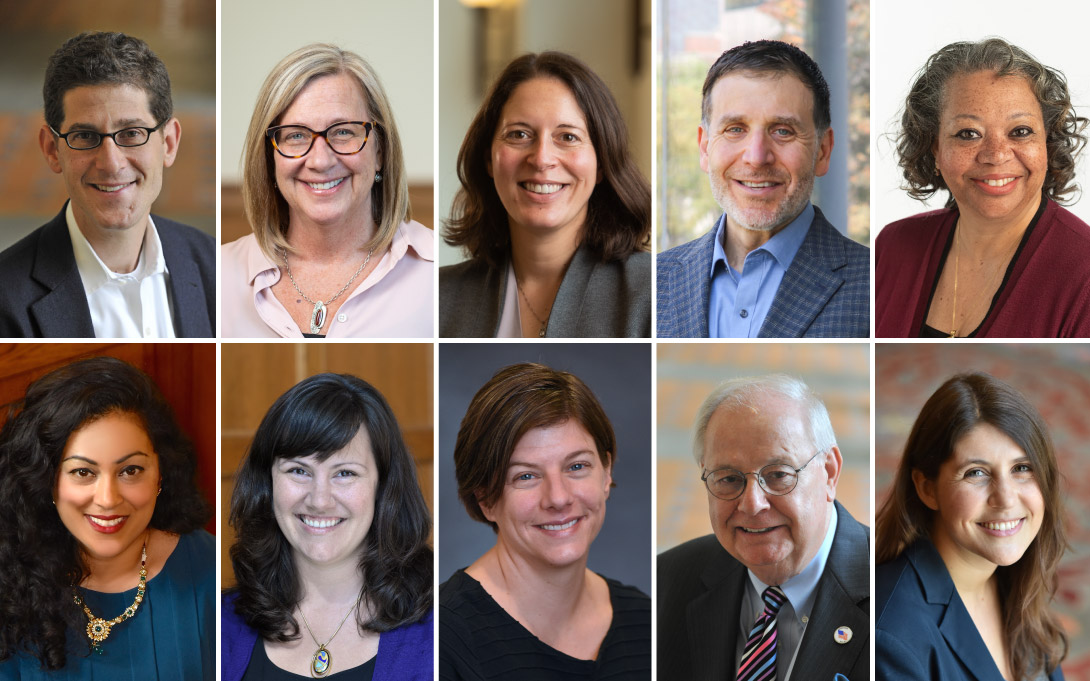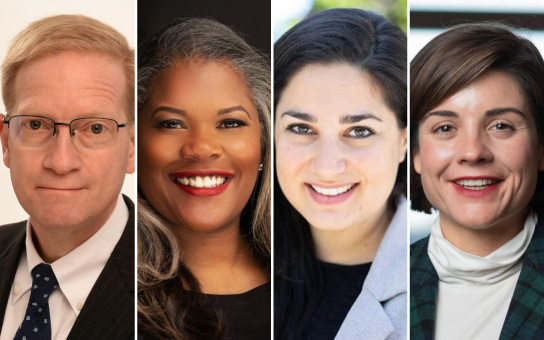
Jenna Bednar published “The Fractured Superpower: Federalism is Remaking U.S. Democracy and Foreign Policy,” in Foreign Affairs.
The Coalition for Networked Information, the Association of Research Libraries, and EDUCAUSE awarded Paul Courant the Paul Evan Peters Award, in recognition of his achievements in advancing network-based information resources and services to enhance scholarship and intellectual productivity.
In partnership with Siemens, Elisabeth Gerber designed and launched a six-week massive open online course, “People, Technology, and the Future of Mobility,” that explores the policy implications of making transportation safer, cleaner, and more equitable through electrification and automation.
Ben Green published “Escaping the Impossibility of Fairness: From Formal to Substantive Algorithmic Fairness” in Philosophy & Technology (October 2022). He presented research at the Simons Institute AI and Humanity Workshop and the UNESCO Artificial Intelligence for Information Accessibility Conference.
Brian Jacob published: “The Return to Hours Worked Within and Across Occupations: Implications for Measuring the Gender Wage Gap” in the Industrial and Labor Relations Review and “Economics of Foster Care” in the Journal of Economic Perspectives. He also received a grant from the Arnold Foundation to study SafeCare, a foster care prevention program.
Morela Hernandez has been named to the editorial advisory board of the MIT Sloan Management Review.
Paula Lantz co-authored an analysis in the American Journal of Public Health that compares four different indices that measure population-level social disadvantage and their association with COVID-19 incidence and mortality.
John Leahy was named chair of the U-M Department of Economics. He published “Rationally Inattentive Behavior: Characterizing and Generalizing Shannon Entropy” in the Journal of Political Economy, June 2022.
Brian McCall, Stephen DesJardins, and Education Policy Initiative predoctoral fellows Kristen Cummings and KC Deane published “Exploring Race and Income Heterogeneity in the Effects of State Merit Aid Loss Among Four-Year College Entrants” in the Journal of Higher Education, May 2000. McCall, DesJardins, and Deane also published “Like Any Other Trap: The Circuitous Path of Student Loan Repayment” in AERA Open.
Katherine Michelmore co-authored “Contextual Origins of Black-White Educational Disparities in the 21st Century” in Social Forces, October 2022. Michelmore, Kevin Stange, and Megan Tompkins-Stange received a $2.7 million IES DOE grant for their work “Early First-Dollar Categorical Need-Based Aid: A New Model for Making College Affordable?”
Jeffrey Morenoff testified before the Senate Homeland Security and Governmental Affairs Committee about the 2020 Census undercount in Detroit. He is working with the City of Detroit and the City of Chicago on this issue.
Mara Ostfeld was awarded one of eight Anti-Racism Grants from the U-M Office of the Vice President for Research for her collaboration with the University of Puerto Rico, Río Piedras Campus. She is the new research director for the Center for Racial Justice.
In addition to serving as associate director of the Center for Racial Justice, Dominique Adams-Santos will take on a new role as the associate diversity, equity & inclusion officer for the Ford School.
Yusuf Neggers published “Indian female migrants face greater barriers to post−Covid recovery than males: Evidence from a panel study,” in The Lancet’s EClinicalMedicine, September 2022.
Susan D. Page wrote “A Smarter U.S. Assistance Strategy for Haiti” for the Council on Foreign Relations.
Shobita Parthasarathy helped develop a governance framework that centers equity in emerging health and medical innovation and a reference manual about science and technology for federal judges as part of two separate committees for the National Academies of Science, Engineering, and Medicine.
Natasha Pilkauskas co-authored “Transportation Insecurity in the United States: A Descriptive Portrait” in Socius: Sociological Research for a Dynamic World. She and Katherine Michelmore published “The Earned Income Tax Credit, family complexity and children’s living arrangements” in The Russell Sage Foundation Journal of the Social Sciences. She, Michelmore, and Luke Shaefer were awarded a grant to study the effects of the Child Tax Credit on the economic well-being of low-income families from the Washington Center for Equitable Growth.
Kaitlin Raimi published: “Moral hazard or not? The effects of learning about carbon dioxide removal on perceptions of climate mitigation in the United States” in Energy Research & Social Science and “Curbing single-use plastic with behaviour change interventions” in Nature Reviews Earth & Environment.
Joy Rohde published “Beyond torture: Knowledge and power at the nexus of social science and national security” in a special edition of History of the Human Sciences, October 2022.
Joe Schwarz hit the campaign trail as part of Republicans for Whitmer.
Fabiana Silva published “What predicts employer discrimination? The role of implicit and explicit racial attitudes” in Social Science Research, August 2022. She presented at the Russell Sage Foundation Pipeline Conference and at the American Sociological Association meeting.
Molly Spencer published two essays: “Wayfaring: On the Poetic Line as a Generative Space,” in Mentor and Muse, August 26, 2022, and “‘A Privilege, That Conversation’: On the Overheard in Ellen Bryant Voigt’s Kyrie,” in West Branch, Spring/Summer 2022.
David Thacher published “Two Kinds of Problem-Solving” in Policing: A Journal of Policy and Practice, August 2022, and “Shrinking the Police Footprint” in Criminal Justice Ethics, April 2022.
In a special edition of the History of Education Quarterly, July 2022, marking the 20th anniversary of No Child Left Behind, Maris A. Vinovskis published “Federal Compensatory Education Policies from Lyndon B. Johnson to Barack H. Obama.”
In September 2022, Celeste Watkins-Hayes joined the Russell Sage Foundation Board of Trustees.

Welcome & congratulations
Sam Bagenstos was appointed as the inaugural Arlene Susan Kohn Professor of Social Policy. He is a prolific legal scholar and one of the nation’s foremost experts in constitutional and civil rights related to disability, housing, employment, voting, criminal justice, and reproduction. Bagenstos currently serves as General Counsel of the U.S. Department of Health and Human Services.
Judge Laurel Beatty Blunt joins the Ford School as a Towsley Foundation Policymaker in Residence. She brings with her years of legal and political experience, including serving as an attorney, as Director of Legislative Affairs and Counsel to the Voting Rights Institute for the Ohio Secretary of State, on the Franklin County Court of Common Pleas, on the Tenth District Court of Appeals, and more.
Longtime faculty members John Ciorciari and Megan Tompkins-Stange received promotions: Ciorciari to full professor and Tompkins-Stange to associate professor, each with tenure, at the Ford School. Ciorciari is widely recognized as a leading scholar of southeast Asian politics, fragile states, international law and security, and global governance. Tompkins-Stange is a pioneering scholar on the role of philanthropic foundations in the arena of educational policy in the United States. Amy Harris became a lecturer at the Ford School and will lead this year’s International Economic Development Program (IEDP) course and study trip to Chile.
Amy Harris became a lecturer at the Ford School and will lead this year’s International Economic Development Program (IEDP) course and study trip to Chile.
Megan Stewart joined the Ford School as an associate professor. She is an expert in international political conflict and revolutionary movements internationally and in the United States.
More in State & Hill
Below, find the full, formatted fall 2022 edition of State & Hill. Click here to return to the fall 2022 S&H homepage.
